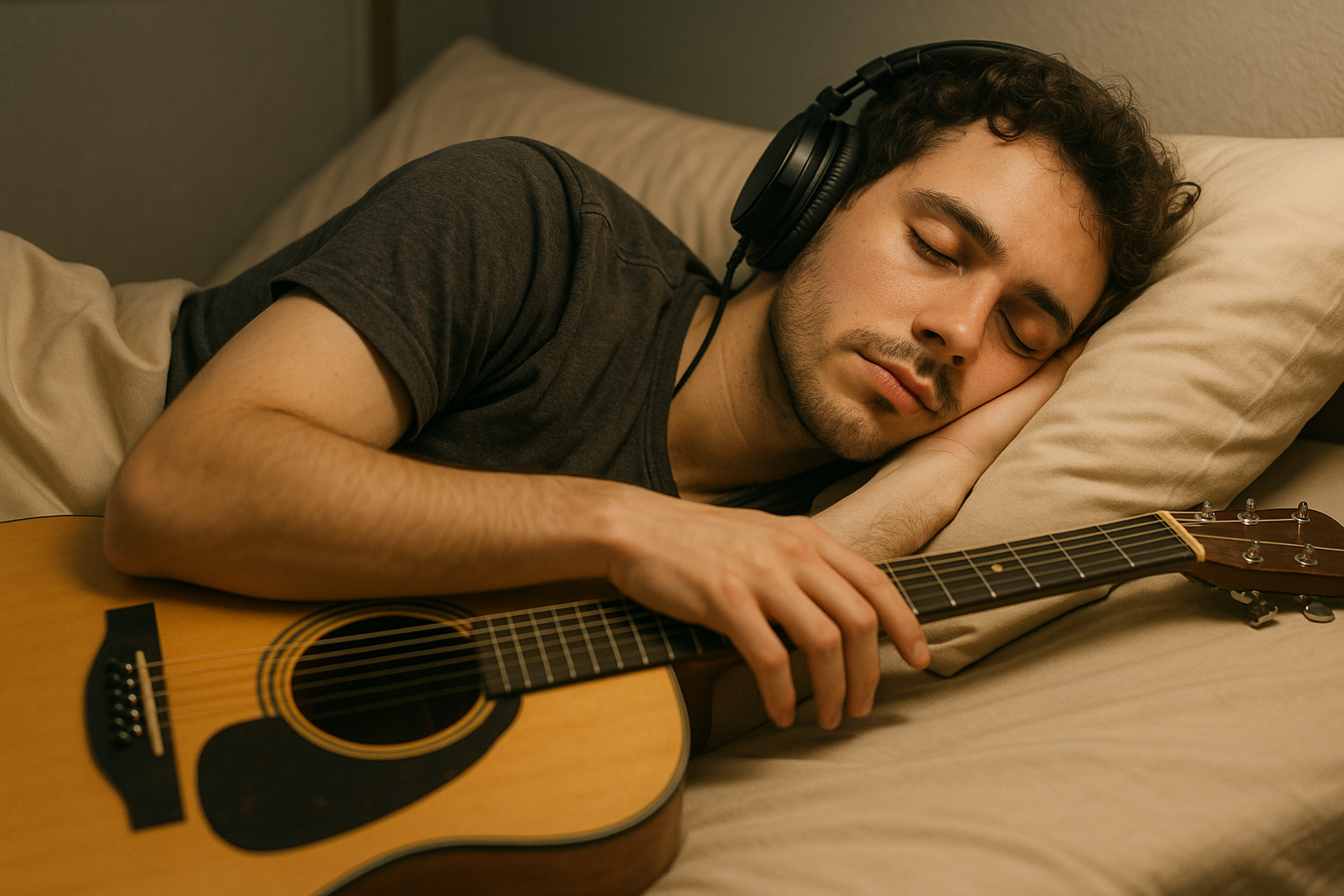When people think about improving their musical skills, they usually focus on practice routines, instruments, or theory. Rarely do they consider one of the most powerful tools for progress: sleep. While practice builds knowledge and skill, sleep consolidates those gains. Without proper rest, hours of practice may not stick, while quality sleep can accelerate growth and sharpen creativity.
In this article, we’ll explore why sleep is essential for musicians, how it affects memory and coordination, the dangers of neglecting rest, and practical strategies to use sleep as part of your music-learning journey.
Why Sleep Matters for Musicians
1. Memory Consolidation
During sleep, the brain organizes and strengthens the information you learned while awake. This includes both declarative memory (facts like music theory) and procedural memory (skills like playing scales). Without enough sleep, new skills don’t transfer effectively to long-term memory.
2. Muscle Memory Enhancement
When you practice a passage repeatedly, your brain builds neural pathways to execute it smoothly. Sleep reinforces these pathways, making movements more automatic the next day. That’s why difficult passages often feel easier after “sleeping on it.”
3. Creativity and Problem-Solving
Sleep boosts creativity by allowing the brain to connect ideas in new ways. Musicians often find that solutions to tricky passages or fresh improvisational ideas come after a good night’s rest.
4. Emotional Balance
Music is emotional, and lack of sleep affects mood. Rested musicians are more patient, motivated, and able to enjoy practice, while fatigue leads to frustration and burnout.
What Happens in the Brain During Sleep
Sleep occurs in cycles, each with different effects on learning:
- Non-REM sleep: Helps consolidate declarative memory (like memorizing scales, notes, and theory).
- REM sleep: Strengthens procedural memory and creativity, making it crucial for motor skills and improvisation.
Both stages are essential for well-rounded musical growth. Skipping sleep interrupts these processes, weakening the benefits of practice.
The Risks of Ignoring Sleep
Many students try to practice late into the night, thinking more time equals faster progress. But lack of sleep creates problems such as:
- Slower reaction times: Reducing coordination and rhythm accuracy.
- Poor memory: Forgetting passages you practiced the day before.
- Increased tension: Fatigue makes posture and technique sloppy.
- Higher risk of mistakes: Tired brains process information less efficiently.
- Reduced motivation: Sleep-deprived practice feels frustrating and unproductive.
In the long run, ignoring sleep delays progress rather than accelerating it.
How Much Sleep Do Musicians Need?
Most adults need 7–9 hours per night for optimal function, while teenagers often need closer to 9 hours. The exact amount varies, but consistency is key. Practicing regularly without proper sleep is like watering a plant without giving it sunlight—it won’t grow.
Naps and Short Rest Periods
Short naps (10–30 minutes) can provide quick boosts in alertness and focus. Longer naps (60–90 minutes) allow the brain to complete full sleep cycles, enhancing memory consolidation. For musicians, napping after a practice session can strengthen retention of what was just learned.
Strategies for Using Sleep to Boost Musical Development
1. Plan Practice Around Sleep
Schedule challenging practice sessions earlier in the day so the brain has time to process them during sleep. Avoid late-night cramming sessions.
2. Prioritize Consistent Bedtimes
Going to bed and waking up at the same time helps regulate your body’s rhythms, ensuring better sleep quality.
3. Combine Practice With Rest
After practicing a tricky section, take a short nap or rest. Your brain continues learning even while you’re off the instrument.
4. Create a Sleep-Friendly Environment
- Keep your room dark and cool.
- Avoid screens at least 30 minutes before bed.
- Develop a calming pre-sleep routine, like stretching or light reading.
5. Avoid Over-Practicing
Excessive practice can overstimulate the brain, making it harder to sleep. Balance is essential: practice with focus, then rest.
Balancing Practice and Rest
Think of practice and sleep as partners. Practice provides raw material, and sleep refines it. Too much of one without the other creates imbalance:
- All practice, no sleep: Knowledge fades, progress slows.
- All sleep, little practice: Rested but untrained.
- Balanced practice and sleep: Maximum growth and retention.
Stories From Musicians and Research
Professional musicians often stress the importance of rest. Pianists preparing for recitals, for example, frequently report breakthroughs after a good night’s sleep. Research also confirms this: studies show musicians who sleep after practice perform significantly better the next day than those who don’t.
Using Sleep as Part of Your Music Routine
- End your day with light review practice. This primes your brain to consolidate it overnight.
- Keep a journal next to your bed. If musical ideas or solutions pop up, jot them down.
- Listen to calming music before sleep to relax your body and mind.
Final Thoughts: Rest as Part of Practice
Sleep is not wasted time—it’s part of the learning process. Every hour of rest reinforces the skills you worked so hard to practice. By prioritizing quality sleep, you’ll see faster progress, better performances, and more joy in your musical journey.
So instead of staying up late repeating a passage 20 more times, consider closing your eyes and letting sleep do its work. When you wake up, you may find the music flows more easily than before.
